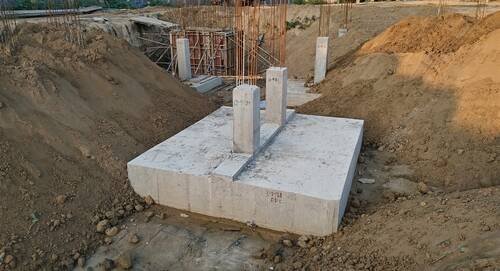In construction, the strength of your final structure doesn’t rely solely on the materials used—it hinges on the strength of the connections that bring it together. From the blueprint to the final build, every phase of your project depends on having the right partnerships. Think of these relationships as “links” in a chain: interconnected, aligned, and critical to the outcome.
Whether you’re planning a new residential build or managing a large-scale commercial development, your success depends on these vital links. In this post, we’ll explore how this metaphor of the “link” applies to real-world construction, and why choosing the right people and partners at every stage makes all the difference.
1. Every Project Starts with a Strong Link
Before a single shovel hits the ground, your construction project begins with planning—and that starts with selecting the right team. Just like a chain is only as strong as its weakest link, a project is only as reliable as the experts involved. From architects and designers to builders and inspectors, each plays a critical role.
In particular, the general contractor often serves as the primary link between all parties. They coordinate vendors, subcontractors, materials, and timelines to ensure every stage runs smoothly. If this central link fails, the rest of the chain weakens. That’s why due diligence during the contractor selection process is essential.
Moreover, strong communication is the glue that keeps all links tight. A dependable contractor will communicate clearly with both the client and subcontractors, reducing missteps and unnecessary costs. This foundational relationship sets the tone for the entire project.
2. Linking Vision to Execution
Designing your dream home or commercial facility is exciting, but bringing that vision to life requires a series of well-executed steps. This is where many projects either shine or stumble. The best general contractors understand how to take your ideas and link them to practical, budget-conscious solutions that don’t sacrifice quality or style.
Here, attention to detail becomes the connecting link between plans and reality. Great contractors know how to analyze blueprints, identify potential challenges early, and provide alternatives that keep your project moving forward. They bridge the gap between concept and construction, ensuring that what you imagine on paper becomes a solid, livable space.
In Maine and beyond, skilled contractors also provide value by aligning your vision with building codes, zoning laws, and energy efficiency requirements. These links to compliance aren’t glamorous—but they’re necessary to avoid legal issues and future maintenance headaches.
3. The Link Between Time and Budget
Time and money are closely linked in construction. In fact, delays often translate directly into increased costs, particularly if materials go to waste or subcontractors have to be rescheduled. A trusted contractor keeps a close eye on both the clock and the ledger.
That said, good time management in construction doesn’t just mean getting things done fast. It means sequencing tasks efficiently, anticipating slowdowns, and resolving obstacles before they become major setbacks. The contractor is the crucial link that ensures each team—from electricians to roofers—shows up at the right time, in the right order.
Budgeting is also a complex web of linked elements: materials, labor, contingency, and permits. When one piece changes, it affects the others. That’s why transparency in budgeting is key. An experienced contractor can foresee these interactions and keep you informed about how adjustments will impact overall costs.
4. Innovation and Sustainability: The Modern Link to the Future
Today’s buildings aren’t just about brick and mortar—they’re about innovation and long-term sustainability. Whether it’s incorporating solar energy, using recycled materials, or integrating smart home technology, contractors must link modern design trends with functionality and long-term value.
The construction industry has evolved, and contractors who stay up to date with new methods and certifications can offer their clients a better product. In Maine, for example, where energy efficiency is both a legal and practical concern, these innovations can mean major savings on heating bills during the long winters.
Furthermore, the link between sustainability and property value is undeniable. Environmentally conscious construction doesn’t just benefit the planet—it also appeals to a growing number of homebuyers and tenants. In this way, forward-thinking contractors link today’s build with tomorrow’s market.
5. Choose the Right Link: Why Your Contractor Matters Most
Ultimately, the success of your project depends on who you trust to manage it. Your contractor should not only have the technical expertise to build, but the interpersonal skills to lead. The right partner becomes your most reliable link—tying together ideas, people, processes, and timelines.
If you’re beginning a construction project in New England and want peace of mind, choose a contractor with a reputation for excellence, transparency, and results. For example, companies like Link offer comprehensive solutions for both residential and commercial clients. With decades of experience and a client-first approach, they serve as the critical link that transforms vision into reality.
Look for contractors who offer:
-
Clear contracts and realistic timelines
-
References and a robust project portfolio
-
Open communication throughout the build
-
Knowledge of local regulations and materials
-
Strong project management and budget control
By forging a strong relationship with a proven professional, you gain more than just a builder—you gain a trusted advisor and project ally.
Final Thoughts: Strengthen Every Link for Long-Term Success
In construction, there’s no such thing as an isolated task. Every step, every decision, every individual involved is linked. To build a structure that stands the test of time—whether it’s a new home, a business facility, or a multi-unit complex—you need every link in the chain to hold firm.
Invest in partnerships, communication, and careful planning. Most importantly, don’t underestimate the importance of choosing the right general contractor. With the right link holding your project together, you’re not just building structures—you’re building confidence, security, and a foundation for the future.

